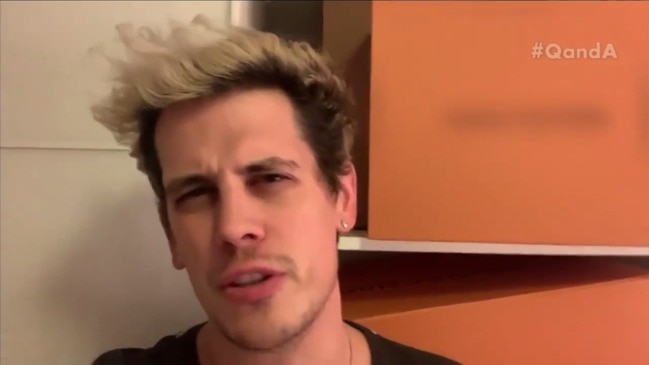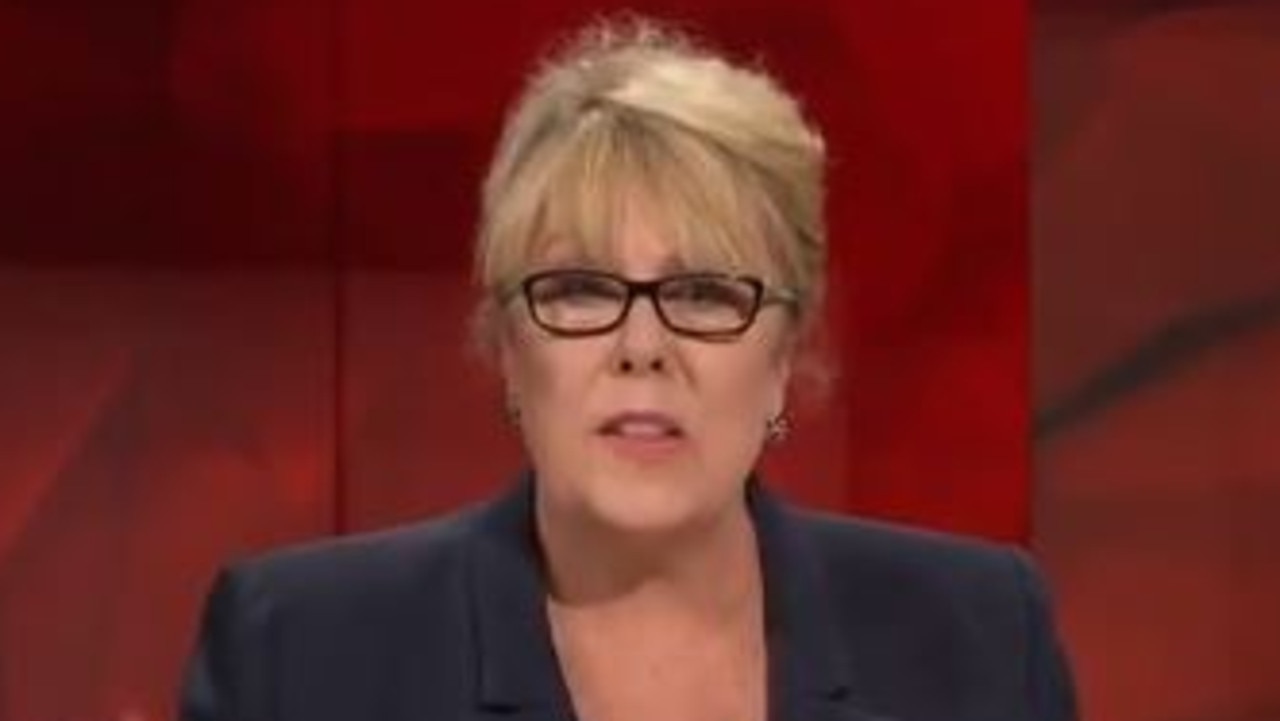Q&A: Jordan Peterson appears on ABC panel show
The panel discussed toxic masculinity, identity politics and free speech — but no one expected a question from Milo Yiannopoulos.

Jordan Peterson has rejected the label that he is a “saviour” for disenfranchised men in Western countries and criticised the view of toxic masculinity as “bordering on the pathological”.
Appearing on the ABC’s Q&A, the Canadian psychologist — interviewed in The Australian today — was joined by broadcaster and author Catherine McGregor, writer Van Badham, Special Minister of State Alex Hawke and Shadow Minister for Employment Services Terri Butler.
The line-up drove Q&A to its biggest ratings of the year last night, with 429,000 five city metropolitan viewers — and a total 624,000 nationwide — tuning in. The figure was up an average 86,000 on last week’s figures.
Despite earlier describing the national broadcaster as “tricky” for putting him on the panel with transgender woman Catherine McGregor, the show — which traversed topics of toxic masculinity, identity politics, transgenderism and free speech — remained tame and fairly civil between panellists.
Perhaps the most bizarre part of the night was a video question submitted by the British commentator Milo Yiannopoulos, who accused Dr Peterson of betrayal.
Disenfranchisement and toxic masculinity
Asked why he seems to resonate with disenfranchised men in Western countries who struggle with globalism and feminism, Dr Peterson rejected the label of “saviour”.
“I think the idea that the West is fundamentally an oppressive patriarchy is an appalling idea.
“The notion the proper way to view history is a battleground between ethnic identities, or identities in general between men and women, it seems to border on the pathological,” he said.
MORE: Watch Caroline Overington's exclusive interview with Jordan Peterson
Ms Badham responded that she found it “interesting” and “flattering” that she was “found terrifying as a feminist”.
“The bigger issue is looking at disenfranchisement,” she said.
“If you’re being sold that it’s feminism and the movement for equality that’s never thrown a bomb, that’s never picked up a gun that’s disenfranchising you or globalism or socialism … we haven’t lived in socialistic economies in the West for a long time.
“It’s neoliberalism which has smashed communities, it’s neoliberalism which has made consumption dominant values in society, it’s neoliberalism that has destroyed the workplace and made our experience of economy so unstable.
Young men look to Jordan Peterson as a ‘saviour’ - but what is it they need saving from? #QandA pic.twitter.com/BCsajnku8N
— ABC Q&A (@QandA) February 25, 2019
“Let me reassure you that women feel disenfranchised as well because we’re all living in a destabilised economy and we’re all suffering from that kind of consumer ideology,” she said.
Mr Butler said: “The problem that I have with kind of structural rigidity of gender roles for men and women is they hurt men and women. They hurt both.
“They hurt the men who want to stay home longer with their kids. They hurt men in real physical ways because we do have a problem in this country where women are more likely to be the victims of violence at home.
“Men are more likely to be the victim of violence in public. But in both it’s men committing the violence by and large, not exclusively, but by and large.”
Dr Peterson responded that he was “not anti-feminist per se”.
“I think the idea that the world would benefit from the movement of talent from both sexes into the workplace as rapidly as possible is someone anyone with any sense should share given the rarity of talent and the necessity for utilising it.
“I do stand by my original statement, though, that there’s a brand of more radical feminism that insists that our culture is best characterised as an oppressive patriarchy and I think first of all that’s an appalling sociological doctrine and I think it has negative psychological effects.”
Surprise appearance from Milo
Commentator and former Breitbart editor Milo Yiannopoulos sent in a video question attacking Dr Peterson for telling the New York Times he was a racist and his questioning his silence on US Supreme court justice Brett Kavanaugh.
“Can you explain why, although you talk a good game about standing up against social justice warriors and the chaotic feminine, but when it comes down to it you always seem to either fold, stay silent or betray your allies?” Mr Yiannopoulos asked.
Milo Yiannopolous asks Jordan Peterson why “when it actually comes down to it, you always seem to either fold, stay silent or betray your allies� #QandA pic.twitter.com/trwvILNzLS
— ABC Q&A (@QandA) February 25, 2019
Dr Peterson said he didn’t think he was “obliged to comment on absolutely everything that happens in everywhere in the world”.
“I don’t think that I am betraying my fundamental base with regards to what happened with Bari (Weiss, of the New York Times) and Milo. I’d probably just apologise to you for that. I don’t think I defended you very well at that particular time. I don’t believe you’re a racist.
“I don’t think the rest of your accusations are warranted however. So that’s what I’d like to say. I did by the way invite you to talk about a year and a half ago when things first started to collapse around you and we never did get around to that and I don’t believe that was entirely my fault,” he said.
Dr Peterson also rejected that he was “in competition” with Mr Yiannopoulos or other commentators.
“There’s been this idea generated in the news by news people who keep reading the news that other news people create that somehow I have a coterie of angry young white men surrounding me because they’re angry about feminism and all these otherisms. I don’t see it like that at all.”
Individual activism
Asked for advice on individual activism and collective responsibility towards climate change, Dr Peterson said: “I’m a psychologist and my experience has been that people can do a tremendous amount of good for themselves and for the people who are immediately around them by looking to their own inadequacies and their own flaws and the things they’re not doing in their lives and starting to build themselves up as more powerful individuals.
“I’m not suggesting in the least and have never suggested that there’s no domain for social action. I’m suggesting that people who don’t have their own houses in order should be very careful before they go about reorganising the world which happens in many ways.”
Ms McGregor said “when you can’t make the rent and you can’t keep the power on, you make a pretty poor revolutionary”.
“That’s flippant but it’s the truth,” she said in reference to a period during her youth when she “flirted” with the Communist Party of Australia.
Ms Badham said: “We have to recognise we’re not powerless. The example of insecure work is a really good one. There is a mass mobilisation against insecure work in this country and it’s called the Trade Union movement.
“They realised a long time ago and so many of the things that we really value about Australia, equality in the workplace, equal pay, the right to occupational health and safety were born by the mobilisation of working people through trade unions.”
Mr Hawke dismissed Ms Badham’s point, and labelled the trade union movement “a Communist attack on the free market”.
Identity politics and quotas
Asked if Martin Luther King’s dream of “a time when people would not be judged by the colour of their skin but the content of their character” was consistent with identity politics, Dr Peterson said it didn’t and that he had a problem with “classifying people by their group identity”.
How is the Identity Politics of today consistent with Martin Luther King’s vision? #QandA pic.twitter.com/vturoKLG8g
— ABC Q&A (@QandA) February 25, 2019
“It’s unbelievably dangerous because partly when you assume that people should primarily be identified by their group, then you can also attribute group guilt to them by their group. And then things go downhill very, very rapidly. And we’ve had no shortage of evidence of that sort of thing happening, say throughout the 20th century.
“If you’re a proponent for example of equality of outcome, of quotas, then you have to accept the proposition it’s the group identity that’s primary. And there’s all sorts of dangers that are associated with that that far outweigh whatever good you’re likely to do.”
.@jordanbpeterson says quotas in politics equate to "virtue signalling". Our questioner responds #QandA pic.twitter.com/d3EUmHx205
— ABC Q&A (@QandA) February 25, 2019
Asked by Ms Butler about equal representation of women in representative positions, Dr Peterson asked if Ms Butler also wanted equal representation of men and women in the bricklaying industry.
“Why do we talk about politics and positions of power? Why don’t we talk about it across the board?” he said.
Ms McGregor said: “I’ve taught in the university sector. Fear of offence, trigger warnings and so on don’t have a place in the academy. They don’t.
“There are very few views that are so repugnant they can’t be ventilated. I really believe that. I’ve been on the receiving end of a lot of very fast bowling, some of which have been very hurtful. But I haven’t sued anyone for defamation, as yet.
“I’ve been threatened by such free speech warriors … and I’ve sucked up a fair bit of it. So I have skin in this game and I’ve put my money where my mouth is. There’s got to be some more resilience and hear viewpoints we don’t agree with.”
Earlier, she said “identity politics is a lazy slogan” that’s “eliminating real differences” in discussions.
“It’s terrific having the disagreement because that’s the great strength of the West is that we do this in public and no-one deplatformed this gentleman (Dr Peterson). I’m thrilled we’re here having this discussion.”
Transgender rights and pronouns
On transgender rights and legislating pronouns, Dr Peterson said that he “treats people very politely as a matter of course”.
“If I’m dealing with someone reasonable I address them in the manner which seems to be most appropriate to the social situation. And most conducive to their, let’s say, wellbeing mutually agreed upon.
Is adhering to people’s preferred pronouns really the starting point for an authoritarian society? #QandA pic.twitter.com/YK7AFsC37G
— ABC Q&A (@QandA) February 25, 2019
“As soon as the government decides they have the right to decide what I have to say because of some false altruism on their part or some underlying and unexpressed ideology, then the answer to that is no damn way,” he said to applause.
Ms McGregor said Dr Peterson’s point deserved weight, but added: “My experience of this has been, and I’ve lived it, I’ve been called he and it more often. I’m being called it as we speak tonight, I know, because I get that most days in one form or another.
“Try telling a flight attendant when you leave town tomorrow that you can’t remember whether you packed your bomb in your luggage or not and see how that goes.
“There are all kinds of regulations of speech. I don’t believe, as a minority, the trans community can legislate change. We have too often in my experience inverted the power relations.”
However, she said she didn’t disagree with Mr Peterson on the fact that born males had an enormous advantage in sport.
“I’m averaging, before I cooked my shoulder, I was averaging 115 in grade cricket, you can fact check that. Going all right,” she joked.
Trump hats and free speech
Asked by an animated audience member how they would react if he had worn a Make America Great Again hat to the show that night, Ms Badham said it was “very interesting to hear people talk about free speech and a need for free speech that implicitly denies the free speech of other people”.
“If you were wearing a Trump hat in my company I would leave. I’m not interested in Trump hat beliefs or Trump hatism. And that is an act of free speech as much as anything else.
“It’s a new experience for a lot of conservatives, to be criticised. To not be part of the dominant culture anymore.”
"What if I wore a Trump hat?" #QandA pic.twitter.com/8vGYiliDbZ
— ABC Q&A (@QandA) February 25, 2019
Mr Hawke joked that he would have no problem with Ms Badham leaving, and that reports of attacks on Trump hat-wearing people in the US concerned him.
Ms Butler said: “I think that if you wore a Trump hat, nobody would punch you here. Everybody is listening to each other. If I wore a pro-choice T-shirt, nobody would punch me here. Everyone is listening respectfully.
“We know there are situations where we can have meaningful, respectful disagreement and debate. And what we all need to do is be better at that. I think that’s just a fact.
“But we also need to not assume everybody else is personally victimising us for our beliefs all the time.
“What I’m hearing from you guys is a lot of people feel personally victimised by feminism. I don’t feel personally victimised by anti-racist movements, even though I’m a white person, because I know it’s not about me personally or what I’ve done.
“It’s about trying to change structures so people get more freedom and more equality. If we could all stop taking every personally and listen a bit more, I think we’ll do a little better.”
Ms McGregor said it would be “reprehensible” if someone was beaten up for wearing a Trump hat.
“I suspect in Australia more trans women are bashed and presenting in their affirmed gender than males wearing Trump hats. But I could be wrong,” she said.
Finishing the panel, Dr Peterson said: “There’s no excuse whatsoever for vilifying someone for wearing a piece of clothing that indicates alignment with, in this particular situation, with an elected majority.
“It does happen and it’s appalling. I think mostly it’s a consequence of a very small number of very well-organised, very radical people who have far more power for reasons that have a fair bit to do with the universities than they should.”



